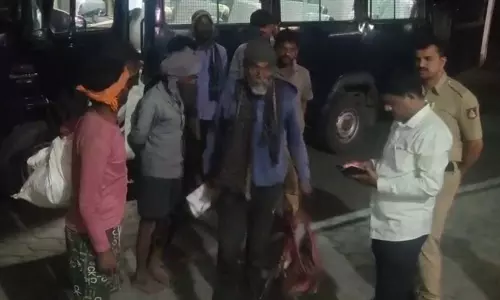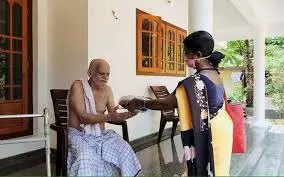
ASHA workers in Kerala demand better honorarium
text_fieldsThe ASHA workers in Kerala, after having to work all day on Covid-19 duty are least acknowledged unlike other health workers, said a report published in the News Minute.
Being the lowest rung of health care infrastructure, they are made to literally fight for their payments, compensations and recognition. Now, they are on the streets to get their honorarium which is pending since March.
"The PHC itself is a good 15 km away. And we don't even get the travel fare for that trip, let alone the basic protective gear like masks and sanitisers. We had to go on strike to get some masks. At the vaccination centre or PHCs, we do not get Protective Personal Equipment (PPE), unlike other health workers. The least they could do is recharge these phones that we need to use all through the day," says Sathi, an AASHA worker in Thenmala panchayat, Kollam, told to the News Minute.
ASHAs – Accredited Social Health Activists – fall under the National Health Mission of the Union Government. They get an incentive from the Union Government as well as an honorarium that is deployed through the respective state governments.
"Every time there is a delay, we hold protests and then they pay. The last protest was in February this year when 2,000 ASHA workers came together in front of the Secretariat demanding the pending honorarium for three months. The same night they credited the dues. We had to fight like this for all our needs, all these years," says S Mini, state convener of the Kerala ASHA Health Workers Association.
"It is through relentless strikes that the Rs 100 honorarium was increased to Rs 6,000 now. The last Rs 1,000 hike was announced in this year's budget. And even this honorarium comes with a number of criteria that the ASHA workers need to meet – being present in meetings, finishing certain tasks and so on. If any of these tasks are unfulfilled, they lose that much money," Mini added.
Also, the Union government incentive varies depending on the number of tasks they finish in a month. It could be Rs 50 for getting someone to take an injection. "If the specified target was to get 10 kids injected and they could only get eight, then they lose the payment for that task," says Mini.
Working on the frontline, without proper safety gears have turned many AASHA workers into patients themselves. At least 30% of the health workers who test positive every day would be ASHA workers, adds Mini.
"There are about 27,000 ASHA workers in the state. So for all major tasks – such as COVID-19 duty – the government needs such a force to get things done. But at all other times, there is absolutely no consideration for these workers, the majority of whom depend on the meagre pay for their livelihood. Their husbands are mostly daily wage labourers who had lost work during the pandemic. This honorarium is very important to them," explains Mini.























